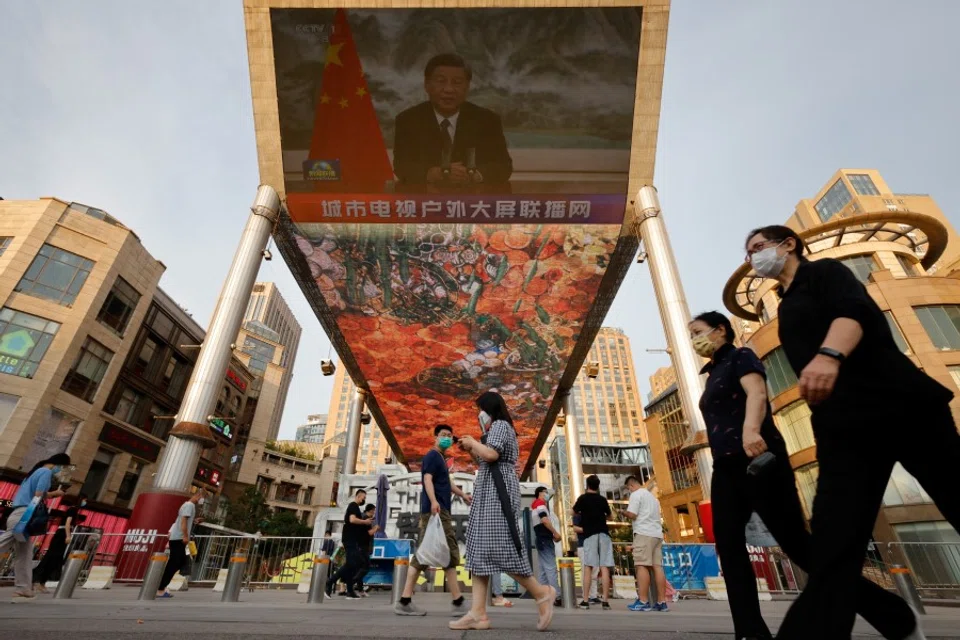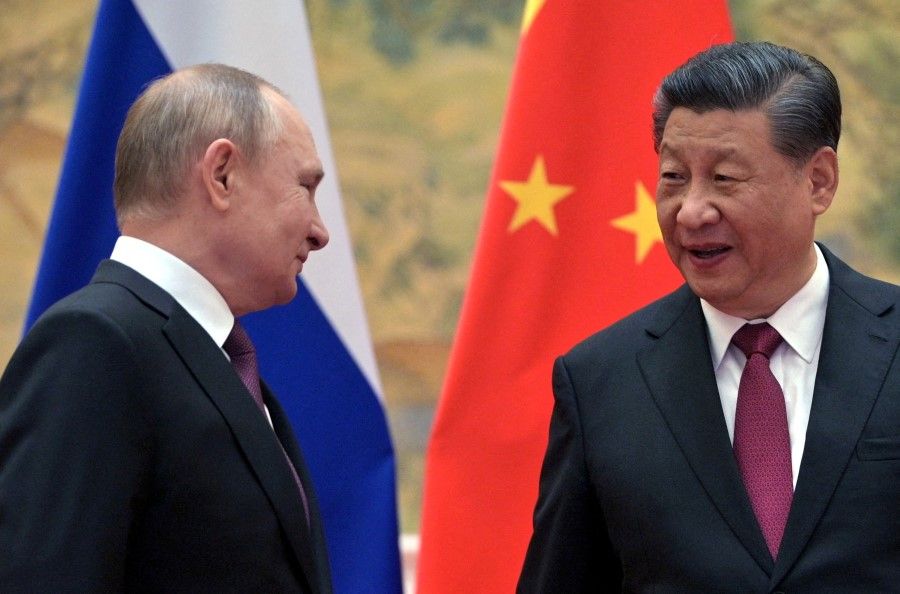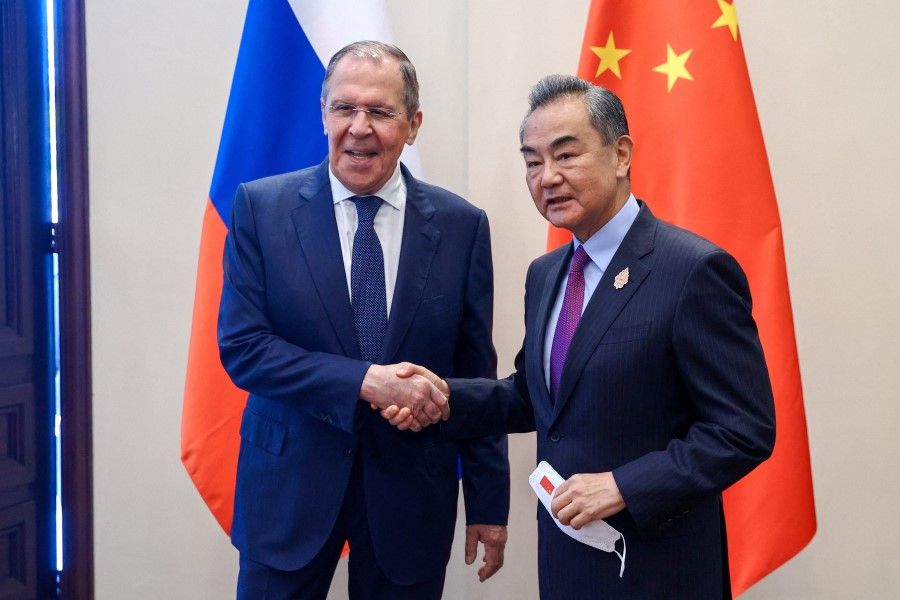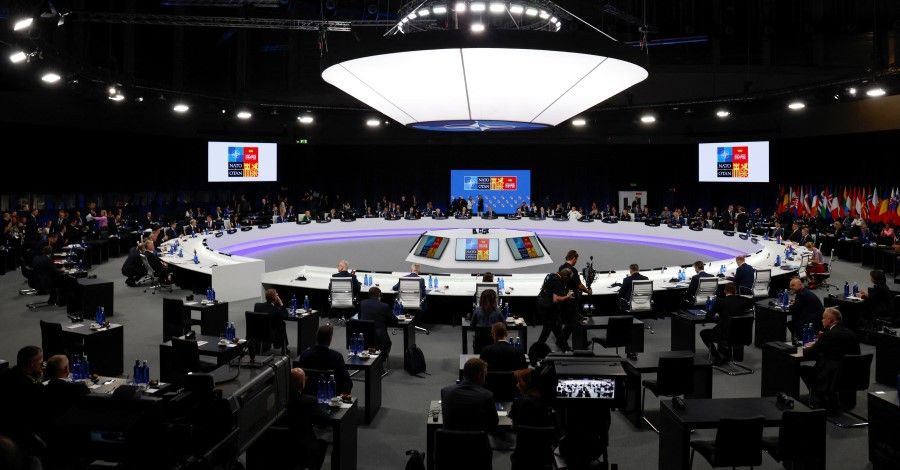China's Global Security Initiative stoking regional tensions

Xi Jinping launched the Global Security Initiative (GSI) at the Boao Forum for Asia on 21 April 2022, after the US and its European allies pressed China to call for a halt to Russian aggression against Ukraine. The GSI is itself a culmination of recent trends and events: the Russian invasion of Ukraine in February, the growing alignment between China and Russia, and an effort to stop what Xi sees to be an Asian analogue to the North Atlantic Treaty Organization (NATO).
Recall that as Russian troops amassed on Ukraine's border, President Vladimir Putin met Xi in Beijing on 4 February 2022. They issued a joint statement which declared a "friendship with no limits" and "cooperation with no "forbidden areas", and specifically condemned NATO enlargement in Europe as well as the US's Indo-Pacific strategy in Asia. Three weeks later, Russia invaded Ukraine. China's continued its rhetorical support for Russia's war and cast the blame on NATO. This brought Western countries to see Xi, whose worldview and revisionist international agenda closely aligns with Putin's, as "a challenge to our interests, our security and our values".
Xi's GSI speech doubled down on his alignment with Russia against the "hegemonism" of the West. He called for "common, comprehensive, cooperative and sustainable security" that respects "the sovereignty and territorial integrity of all countries", "non-interference in domestic affairs", and "the independent choices of development paths and social systems made by people in different countries". More importantly, Xi asked his Asian audience to "reject a Cold War mentality", "oppose unilateralism", and "say no to group politics and bloc confrontation".

Soon after, China's First Vice Foreign Minister Le Yucheng explained the thinking behind GSI to a China-hosted global forum of think tanks. He repeated the themes in Xi's speech but Le went further, arguing that the US has been "flexing its muscle[s]" in China's periphery, creating exclusive groups arrayed against China and stoking Taiwan tensions to test China. He posed a question: "If this is not an Asia-Pacific version of NATO's eastward expansion, then what is? Such a strategy, if left unchecked, would bring horrible consequences and push the Asia-Pacific over the edge of an abyss."
What is new in GSI is the push for a China-centered security community and new Chinese pressure on BRI partners to join China's militarising struggle against US "hegemonism".
The fact is, in recent years, the US has accrued no new treaty allies in Asia. Washington has pursued flexible minilateral partnerships, not alliances, such as the Quadrilateral Security Dialogue (Quad) and the Australia-UK-US (AUKUS) deal, and bilateral security partnerships with countries such as Singapore and Vietnam.
GSI builds on slogans and influence developed by earlier Xi initiatives, which include the "new type of great power relations" that called on the US to respect China's core interests and withdraw from Asia. Also, the Belt and Road Initiative and the "community of shared destiny for all mankind" promoted China-led visions of economic and political global governance. What is new in GSI is the push for a China-centered security community and new Chinese pressure on BRI partners to join China's militarising struggle against US "hegemonism".

The logic behind the Sino-Russian partnership explains how it puts China and Russia at loggerheads with US alliance members in Europe and Asia. After the Cold War, NATO accepted membership applications from former Soviet satellite nations and republics that had democratised. One could argue that this NATO policy ignored Russia's desire for a great power sphere of interest in the post-Soviet space. In his 9 May 2022 Victory Day speech, Putin said this NATO policy gave Russia a legitimate casus belli because Russian interests and dignity deserved respect in lands historically associated with Russian civilisation.
US allies in Europe and Asia now see Russia and China joined at the hip to challenge the democratic values, sovereign rights, and legal protections coded into the Western-sponsored rules-based order.
China shares this Russian conception that a great power should manage its neighbourhood. Like Putin, Xi grows his military might, threatens neighbours with punishment for disrespect, and above all wants US-led alliances banished from his neighbourhood. Ironically, as with Europe, US-led security partnerships in Asia have grown stronger precisely because China's neighbours fear for their sovereignty and territorial integrity.
US allies in Europe and Asia now see Russia and China joined at the hip to challenge the democratic values, sovereign rights, and legal protections coded into the Western-sponsored rules-based order. As evidence of danger, they can point to Russia's war in Ukraine and China's open preparations for armed conflict along its Pacific maritime and Indian land borders to seize claimed historical territories and rights.

This new reality has brought normally fractious EU and NATO members into close unity to aid Ukraine, boost their own security efforts and punish Russia with sanctions. It also explains why at their June summit meetings, the G7 and NATO agreed on measures to counter Chinese coercion in the Indo-Pacific, and why democracies in Asia are joining hands in new defensive cooperation and links with NATO. This counterbalancing against the new risks posed by China's growing bellicosity produced the Quad in 2017 and AUKUS in 2021.
In comparison, China's GSI has produced little thus far.
The Ukraine war in 2022 crystallised new minilaterals, including a trilateral Japan-South Korea-US security dialogue, the five-member Partners in the Blue Pacific (US, Japan, UK, Australia, and New Zealand), and a "mini-Indo-Pacific Quad" consultation among Japan, South Korea, Australia and New Zealand.
In comparison, China's GSI has produced little thus far. China announced a secretly negotiated bilateral security pact with Solomon Islands just as GSI was launched. However, in a subsequent meeting with ten other members of the Pacific Islands Forum, Foreign Minister Wang Yi could not persuade them to sign the same kind of security agreement. Xi pushed GSI at the BRICS Summit in June. South Africa and Russia endorsed it, but India and Brazil declined to do so.
Angry at how US allies and friends are rallying to defend the rules-based order, China is requesting BRI partners to support GSI. What will this mean for Southeast Asia? ASEAN members will be expected to endorse GSI and warned to avoid Western partnerships. China will offer new types of security assistance and will use its considerable means of economic persuasion. More confrontational strategic signalling via People's Liberation Army military exercises and obstructions of foreign military vessels transiting China's claimed maritime jurisdictions are also more likely. Thus, GSI will likely increase regional tensions and further strain ASEAN's centrality and unity of purpose.
This article was first published by ISEAS - Yusof Ishak Institute as a Fulcrum commentary.
